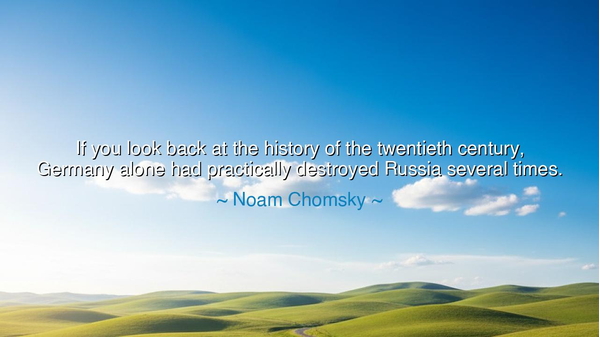
If you look back at the history of the twentieth century, Germany
If you look back at the history of the twentieth century, Germany alone had practically destroyed Russia several times.






The philosopher and historian Noam Chomsky once said: “If you look back at the history of the twentieth century, Germany alone had practically destroyed Russia several times.” His words are not merely a reflection on war, but a lamentation on the cyclical cruelty of human history, a reminder of how nations, blinded by ambition, bring the world again and again to the edge of ruin. In this statement lies both memory and warning: that the wounds of the past are not easily closed, and that those who do not understand the patterns of power and destruction are doomed to repeat them.
The twentieth century was a crucible of fire, and at its heart burned the conflict between Germany and Russia—two titanic nations whose collisions reshaped the earth. In 1914, during the First World War, Germany’s armies thundered eastward, shattering Russian lines and bringing famine, revolution, and collapse. The old empire of the tsars fell not by one blow but by many—by the steel of war and the weakness of the human spirit. Barely had the ashes cooled when, a generation later, in 1941, the fury returned with even greater force. The Nazi invasion, under the name Operation Barbarossa, unleashed destruction on a scale the world had never seen. Villages were burned to cinders, cities starved, millions perished. It was not merely a military campaign—it was an apocalypse.
And yet, from that devastation, Russia endured. Chomsky’s observation is not only about what was destroyed, but also about what survived. For though Germany had “practically destroyed” Russia—economically, socially, demographically—the Russian people rose from the ruins each time, rebuilding their fields, their homes, their very souls. Like the mythic phoenix, they emerged scorched but alive, carrying the memory of loss as a warning carved into the heart of a nation. Such endurance is both inspiring and tragic: inspiring in its strength, tragic in that humanity should need such strength at all.
Chomsky, ever the critic of power and empire, reminds us that destruction rarely ends with a single act. It echoes across generations—through trauma, distrust, and vengeance. The wars between Germany and Russia were not isolated events; they were born of the same arrogance that leads nations to believe they can dominate history. He speaks to the folly of nationalism, the poison of militarism, and the blindness of those who pursue glory without compassion. The lesson is not confined to Europe—it belongs to all humanity. For as long as we forget the cost of destruction, we walk the same path that led to it.
In the ruins of Stalingrad, one of the fiercest battles ever fought, there is a story told of a single Russian mother who, amid the rubble, refused to flee. When asked why she stayed, she replied, “If I leave, who will remember?” Her words carry the same weight as Chomsky’s. To remember is to resist repetition. To understand the depth of what was lost is to guard against losing it again. Her defiance was not of bullets, but of forgetting.
Thus, Chomsky’s statement is both historical and prophetic. It reminds us that violence begets violence, and that history’s greatest destroyers often become its victims in time. The destruction of one century plants the seeds of fear and hatred in the next. To break this chain, humanity must learn not only to rebuild cities, but to rebuild hearts—to understand rather than conquer, to empathize rather than dominate. The true strength of a civilization lies not in its armies, but in its capacity for remembrance and restraint.
Let this be the lesson: study the past not as an academic exercise, but as a moral inheritance. Remember that behind every statistic of war lies a beating heart, behind every ruined nation, countless unseen lives. The truth of history, as Chomsky teaches, is not that one nation destroys another—it is that all of humanity suffers when pride overtakes wisdom. Let us, therefore, walk humbly before the memory of those who endured, and vow that the fires of the twentieth century shall not be kindled again. For only when we remember the pain of destruction can we truly choose the path of peace.






AAdministratorAdministrator
Welcome, honored guests. Please leave a comment, we will respond soon